The Role of Media in War and Peace in South Sudan
Publication Summary
Much of the commentary in the media and the news reporting in South Sudan tends to be partisan either supporting the government or the opposition. It also tends to take a regional or ethnic line. Consequently, such stances have negatively affected the objectivity of the reporting and weakened the media’s role as a vital instrument for democracy, justice, and accountability.
Media coverage of the on-going violent conflict is, therefore, a double-edged sword, and its ability to incite more violence is indisputable.
The uses of the media as a vehicle for peace-building are currently limited to independent outlets such as the Catholic Radio Network, Eye radio, the United Nations Mission in South Sudan’s Radio Miraya, and other private publications such as Gurtong’s. Although these media establishments have a degree of independence and try hard to present all sides to the issues, it is often the case that those outlets are not necessarily seen as impartial. Both the government and opposition often accuse these outlets of serving as mouthpieces for the other, or for foreign powers, especially that they run on donor funding from outside. Other media outlets are affiliated with the warring sides and are only in the business of mobilization for conflict.
As of recent, the warring parties have attempted to restrict the media space, exercising censorship with an eye to controlling access to information, as well as showing opponents in a negative light. Observers suggest that the government’s crackdown on the media has increased in the past few months, resulting in the closure of two English Language publications by the National Security. However, these strategies have been unsuccessful, as sources of information have multiplied with the use of new technologies, the Internet and mobile phone services.
Most South Sudanese get their information about the war and peace efforts through word of mouth, phone calls, social media, and the radio. Much of this information is often second or third-hand, leaving room for exaggeration, omission, fabrication, and compromised news-reporting ethics. This has not helped in exciting peace, healing, and reconciliation.
Jok Madut Jok is trained in the anthropology of health and holds a Ph.D. from the University of California, Los Angeles (UCLA). He is a fellow of Rift Valley Institute and Director of the Sudd Institute. Jok has held fellowship positions at a number of other institutions, including the United States Institute of Peace and the Woodrow Wilson International Center for Scholars. He also served in the Government of South Sudan as undersecretary in the Ministry of Culture and Heritage for three years. He has also worked in aid and development and author of four books and numerous articles covering gender, sexuality and reproductive health, humanitarian aid, ethnography of political violence, gender-based violence, war and slavery, and the politics of identity in South Sudan and Sudan. His book Breaking Sudan: The Search for Peace, was published in 2017 by OneWorld.

